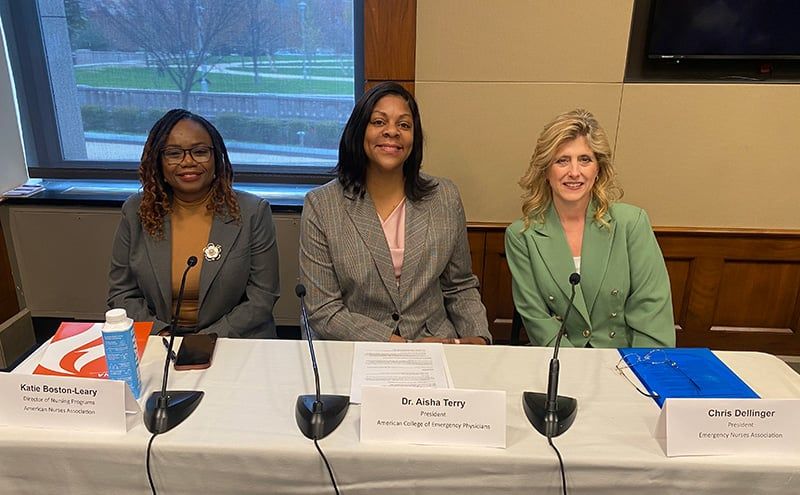Nurses, doctors urge Washington to take action on healthcare violence | Safer Hospitals
Leaders from groups representing physicians and nurses went to Capitol Hill to draw attention to the dangerous incidents in hospitals.
Doctors and nurses have bemoaned the violence they are seeing in emergency departments, and they have taken that message to Capitol Hill.
Healthcare leaders urged lawmakers to pass bills to protect doctors and nurses from violence. From left, Katie Boston-Leary, director of nursing programs at the American Nurses Association; Aisha Terry, MD, president of the American College of Emergency Physicians; and Chris Dellinger, president of the Emergency Nurses Association.

Leaders from the Emergency Nurses Association, the American College of Emergency Physicians, and the American Nurses Association met with congressional staffers last week to draw more attention to the issue.
The Emergency Nurses Association surveyed its members this year, and found more than half (56%) said they had been physically assaulted, verbally harassed or threatened with violence within the past 30 days.
Chris Dellinger, president of the Emergency Nurses Association, said in a statement that she’s experienced violence during her 30 years as an emergency nurse.
“When I first started in emergency nursing, that many years ago, violence was just wasn't something that we would see,” Dellinger said in the briefing.
“As the years have gone on, and as the pandemic has ensued, we have actually seen an increase in violence,” she said. “I have been hit. I have been slapped. I have been kicked. I've had a computer thrown at me. I've been verbally assaulted. verbal assault happens pretty much every day in every shift. And our members of our association, we hear about violence every single day.”
Healthcare advocates have been pressing Congress to approve legislation that would impose tougher penalties for those who assault healthcare workers, similar to protections for airline employees. Previous efforts to clear the measure have stalled in Congress, but healthcare groups have called it a high priority this year.
The groups are also pushing for a separate bill that would empower the Occupational Safety and Health Administration to require the healthcare and social service sectors to implement workplace violence prevention plans.
Aisha Terry, MD, president of the American College of Emergency Physicians, said the bills would help protect healthcare workers, and she’s encouraged that others are supporting those efforts.
“I think that most lay people would be shocked really, to know what is going on behind the closed doors of our emergency departments, relative to violence,” Perry said at the briefing Friday.
“In the year 2023, about 91% of all emergency physicians found that they experienced some type of violence in the emergency department,” Perry said. “That's ridiculous that you should be expected to go to work and have to be assaulted while at work.”
Jennifer Mensik Kennedy, president of the American Nurses Association, referenced the need for tougher legislative protections. She said the legislation is “long overdue.”
“Violence against health care professionals – the very people who are entrusted to care for the sick and encourage healing – is absolutely unacceptable and reprehensible,” Mensik Kennedy said in a statement.
She also called on healthcare organizations to do more to protect their workers.
“It’s the employer’s responsibility to ensure workplace safety and security, but sadly in many health care settings nurses are still experiencing violence at alarming rates,” Mensik Kennedy said. “Too many of my fellow nurses’ lives have already been lost to workplace violence. We need to act now to break the deadly cycle of violence against health care professionals.”
Katie Boston-Leary, director of nursing programs at the ANA, said at the briefing that violence in healthcare is “a major issue.” She said that many nurses don’t disclose assaults.
“We know that there are countless incidents of workplace violence that are not reported properly, due to apathy, because nurses don’t feel that there are appropriate avenues to deal with this,” she said.
More than two nurses are assaulted every hour, and 57 assaults on nurses occur each day, according to a report from Press Ganey.
Several fatal shootings have occurred in hospitals over the past two years, including the killing of a New Hampshire hospital security guard in November. An unarmed security guard was fatally shot in the maternity ward of an Oregon hospital in August. A hand surgeon was shot and killed in an orthopedic clinic in Tennessee.
Doctors and nurses say attacks in hospitals have occurred with shocking regularity.
Children’s hospitals face complex challenges dealing with disasters
April 18th 2025Pediatric hospitals deal with different factors in weather-related events and other emergencies. Terri Wilson of the Children’s Hospital Association talks about the challenges and the need for more planning and support.
Telehealth faces a looming deadline in Washington | Healthy Bottom Line podcast
February 12th 2025Once again, the clock is ticking on waivers for telemedicine and hospital-at-home programs. Kyle Zebley of the American Telemedicine Association talks about the push on Congress and the White House.